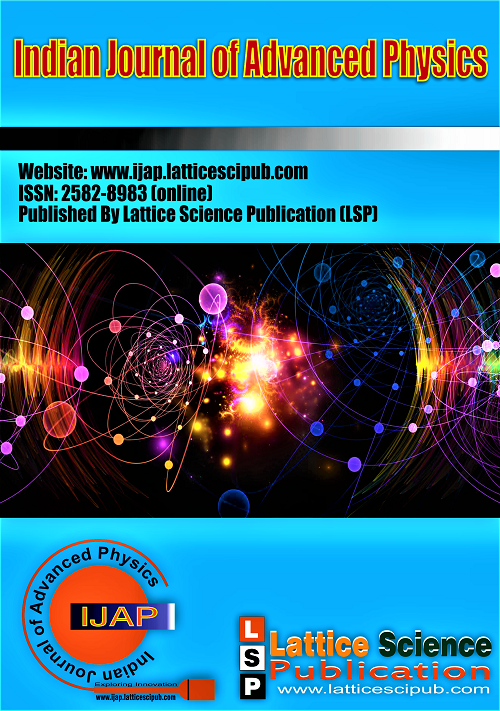A Comprehensive Study of Mass Accretion and Atmospheric Effect of Raindrop
Main Article Content
Abstract
The mass accretion of a raindrop in different layers of the atmosphere is not dealt with so far. A comprehensive brief study of the motion of raindrops through the atmosphere (i) without mass accretion, (ii) with mass accretion and (iii) finally pressure variation in the atmosphere with altitude using Bernoulli’s equation is illustrated. Acquirement of mass from moist air is mass accretion and mass accretion during the motion of raindrop through resistive medium holds an arbitrary power-law equation. Bernoulli’s equation when applied to it, the generalized first-order differential equation is reduced to a polynomial equation. Results show a single intersecting point of approximate terminal velocity 1 m/s and mass 10-06 mg as illustrated. Terminal velocity is achieved within 25 sec. There is the approximate exponential growth of terminal velocity. An increase in momentum is due to mass accretion during motion. Various conditions of no mass accretion and mass accretion show the same result while for atmospheric effect using Bernoulli’s equation the first-order differential equation reduces to a polynomial equation.
Downloads
Article Details

This work is licensed under a Creative Commons Attribution-NonCommercial-NoDerivatives 4.0 International License.
How to Cite
References
M. A. Ilyas and J. Swingler, “Piezoelectric energy harvesting from raindrop impacts”, Energy 90, 2015, pp. 796-806. doi: 10.1016/j.energy.2015.07.114
A. D. Sokal1, “The falling raindrop, revisited”, American Journal of Physics 78, 2010, pp. 643-645. doi: 10.1119/1.3246871
Sneha Dey and A. Ghorai, “Some work out problems on motion of raindrop”, Asian Journal of Engineering and Technology, 9, 2, 2021, pp. 33-37.
B. Lynch and G. Lommatsch, Modeling the velocity of a raindrop, May 6, 2011, http://home2.fvcc.edu/~dhicketh/DiffEqns/ Spring11projects/ Ben_Lynch_Gavin_Lom matsch/DiffEq Project/ DiffEqProjectGavinBen.pdf [8 August 2012]
K. S. Krane, “The falling raindrop: Variations on a theme of Newton”, American Journal of Physics 49, 1981, pp. 113-117. doi: 10.1119/1.12537
I. Adawi, “Comments on the raindrop problem”, American Journal of Physics 54, 1986, pp. 739-740. doi: 10.1119/1.14465
M. H. Partovi and D. R. Aston, “The generalized raindrop problem”, American Journal of Physics 57, 1989, pp. 912-920. doi: 10.1119/1.15846
G. Zhu, J. Chen, T. J. Zhang, Q. S. Jing and Z. L. Wang, 2014, Nature communications 5: 3426:1-9. https://www.nature.com/articles/ncomms4426





